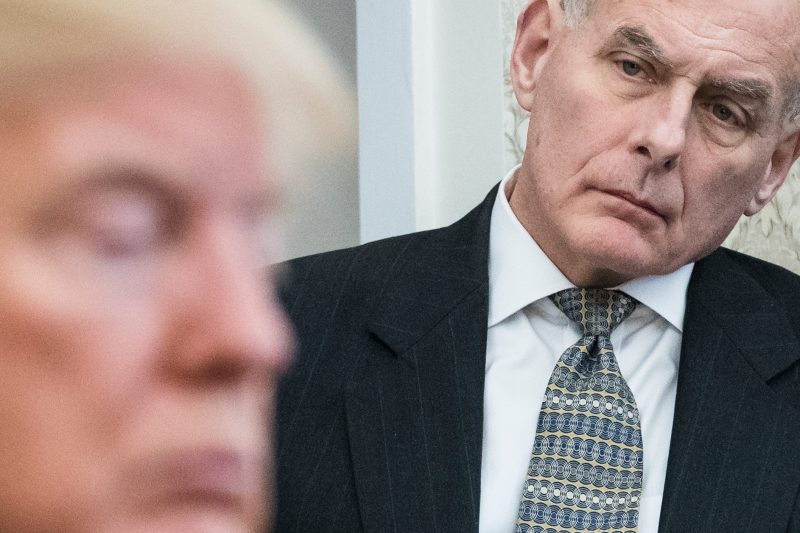John F. Kelly, the longest-serving chief of staff in President Donald Trump’s White House, watches Trump dominate the GOP primary with increasing despair.
“What’s going on in the country that a single person thinks this guy would still be a good president when he’s said the things he’s said and done the things he’s done?” Kelly said in a recent interview. “It’s beyond my comprehension he has the support he has.”
Kelly, a retired four-star general, said he didn’t know what to do — or what he could do — to help people see it his way.
“I came out and told people the awful things he said about wounded soldiers, and it didn’t have half a day’s bounce. You had his attorney general Bill Barr come out, and not a half a day’s bounce. If anything, his numbers go up. It might even move the needle in the wrong direction. I think we’re in a dangerous zone in our country,” he said.
No president has ever attracted more public detractors who were formerly in his inner circle. They are closely watching his rise — cruising in the GOP nomination contest and, in most polls, tying or even leading President Biden in a general election matchup — with alarm. Among them are his former vice president, top military advisers, lawyers, some members of his Cabinet, economic advisers, press officials and campaign aides, some of whom are working for other candidates.
Among their reasons for opposing a second Trump term, they cite the 91 criminal charges against him, his attempts to overturn the 2020 election, his false claims of election fraud, his incendiary rhetoric in office, his desire to weaponize the Justice Department, his chaotic management style, his likely personnel choices in a second term, and his affinity for dictators.
Interviews with 16 former Trump advisers — some of whom spoke on the condition of anonymity to discuss their former boss — show they are grappling with how they can puncture Trump’s candidacy in 2024, whether they can or should coordinate with one another and whether their voices will even matter.
Additionally, more than a dozen people once in his employ could end up taking the stand and providing testimony as part of multiple criminal trials, according to people with knowledge of the cases and court documents.
At the same time, even some who have publicly declared Trump unfit for office have said they would still support him over Biden in 2024.
So far, Trump has surged toward the GOP nomination even as former aides critical of him have blanketed the airwaves, giving scathing speeches, testifying on camera in front of congressional committees and penning books — shaking off the kinds of condemnations that could mortally wound another politician.
“These media whores are always looking for their next grift — whether it’s book deals or cable news contracts — because they know their entire worth as human beings revolve around talking about President Trump,” said Steven Cheung, a Trump spokesman. “They clearly don’t own any mirrors because if they did, they would not be able to look at themselves every day knowing what they’re doing is hurting the country. These charlatans are disgusting and should be wholly ignored.”
Trump advisers note he has a coterie of loyal aides and advisers such as Stephen Miller, Kellyanne Conway and Dan Scavino, who have been allied with him for years. Arkansas Gov. Sarah Huckabee Sanders (R), a former press secretary, endorsed Trump onstage at a rally in Florida last week. Other former top aides are putting together a 2025 plan and want to rejoin the administration.
“The time has come to return to the normal policies of the Trump era which created a safer, stronger, and more prosperous America,” Sanders said.
In recent fundraisers, Trump has been questioned by donors on multiple occasions about his personnel choices and has attacked former officials who have spoken out against him, according to people familiar with the questioning. Trump has argued that while in the White House, he listened to people he should not have — and made bad hires, particularly at the Pentagon and Justice. Donors have expressed concern that Trump hired so many people who have attacked him, people familiar with the conversations said.
This time, Trump said, he would look out for people who are loyal and “smart.” A second term in office, people close to him say, would have people who “actually support President Trump,” in the words of one adviser.
“I learned how deep the deep state is,” he recently told donors at an event.
Every president has the occasional critic from within his administration. Scott McClellan, former press secretary in the George W. Bush White House, rattled his former colleagues with a scathing look behind the scenes. Former defense secretary Robert Gates offered a harsh critique of President Barack Obama’s judgments that was used as a cudgel by Obama’s critics.
What makes Trump different is how many former aides have come out against him, said Douglas Brinkley, a presidential historian, and how vituperative their criticisms have been. Their motives are varied, and while some are fueled by genuine concerns, others, he said, are driven by a new incentive structure. Some of the attacks could also be undercut because voters see the former aides as enablers who are now simply looking to reclaim their reputations.
“You can get paid for a Washington insider book that dishes dirt; there’s been a corrosion of loyalty towards presidents. It wasn’t always that way,” Brinkley said. “And you have a lot of people who want to be decontaminated from Trump because he’s become a symbol of authoritarianism.”
Some Democrats and Republicans say attacks on Trump’s character and behavior have been ineffective because voters have heard similar criticism for eight years. “Everyone knows who Trump is,” said one person close to the former president, who spoke on the condition of anonymity to describe campaign strategy. “It’s not like you’re going to say he’s a bad person, and someone is going to change their mind immediately.”
Ahead of the 2020 election, Democrats learned through focus groups that attacks on Trump’s character did not work as well with independent voters as attacks on his record, according to a prominent Democrat briefed on the work conducted by the Democratic National Committee. Repeatedly, voters said they knew who Trump was and his personal shortcomings did not dissuade them.
Still, what also makes Trump different is the way in which some former advisers speak about him — not griping over a policy disagreement or a personnel choice — but over his fitness to be president and what he might do in a second term.
Former White House counsel Ty Cobb, who defended Trump during the probe into Russian interference in the 2016 election and once was seen as a loyal soldier, said it was imperative for people to vote against Trump.
“He has never cared about America, its citizens, its future or anything but himself. In fact, as history well shows from his divisive lies, as well as from his unrestrained contempt for the rule of law and his related crimes, his conduct and mere existence have hastened the demise of democracy and of the nation,” Cobb wrote in an email. “Our adversaries and our allies both recognize that even his potential reelection diminishes America on the world stage and ensures continued acceleration of the domestic decline we are currently enduring. If that reelection actually happens, the consequences will extinguish what, if anything, remains of the American Dream.”
John Bolton, his former national security adviser, said he had grown frustrated watching many of the Trump attacks fail. Bolton wrote a best-selling book that was sharply critical of Trump on national security; Trump wanted him investigated and charged for writing it.
Bolton said he once hoped to argue Trump wasn’t electable. That argument will not work because Biden is so unpopular, Bolton says.
“So many things that I thought would be telling arguments about Trump — his character, you name it — have proven ineffective,” Bolton said. “The only thing that’s left is Trump’s not fit to be president. He doesn’t have a conservative philosophy. He follows his own personal interest, and that’s not what you need in a president.”
Stephanie Grisham, who worked on the 2016 campaign and then as press secretary to Trump and chief of staff to Melania Trump, said she fears his ascent to the White House. She said a lot of former advisers are weighing what to do — and discussing it with one another.
“Anytime you speak out, all the haters come out and say you’re just disgruntled. All the Democrats come out and say it’s too little, too late. I do think that’s where so many people are,” she said.
More important, Grisham said, is the backlash that comes with Trump attacking you — or his supporters turning on you.
“It’s actual threats for your safety and your family. As we get closer to the election, it’s only going to get more intense. Why am I putting my family and my friends through this if we’re now going to get threats?” Grisham said.
There were calls trying to organize opposition to Trump after he left the White House that fell apart once the group splintered over internal disagreements, Grisham said. Some of the members didn’t get along, and the calls soon stopped, she said.
Grisham said she hoped a group of former aides would come together next year, led by officials like Kelly and Attorney General William P. Barr, but it would take organization and money. Interviews with nine other former aides indicated that no such group currently exists.
Former vice president Mike Pence is not planning to take a public role for or against Trump, according to people close to him. Others close to many former Cabinet officials say they will be silent. Elaine Chao, the former transportation secretary who resigned, Jim Mattis, the former defense secretary, and others have signaled they do not relish a big fight with Trump even as they don’t want him to be the nominee. Former defense secretary Mark T. Esper, who has sometimes leveled criticisms at Trump, did not respond to requests for comment.
Another prominent former official said he was debating whether speaking out would lead to clients dropping him. “If I thought it would make a difference, I’d be more willing to do it. But you’re taking a lot of financial risks, and I haven’t seen any evidence it really matters,” this person said.
A third former official said that many were considering speaking out if Trump became the nominee and was in a position to win. “You want to remind people at the last minute what kind of crazy they might be getting again. I don’t think it works until it’s September or October.”
Some aides say they don’t want Trump to be president again but are loath to be viewed as helping a Democrat. Members of that group, including Barr, have argued Trump is both unfit to serve and has probably committed crimes — but that they still may vote for him over a Democrat.
Marc Short, Pence’s longtime chief of staff and a former Trump adviser, has been sharply critical of the former president.
“If it’s Biden versus Trump, the implicit assumption is, efforts to hurt Trump are going to benefit Biden,” Short said. “If you’re putting yourself against the Constitution, I think it’s disqualifying, but I wouldn’t want to be helping Biden.”








